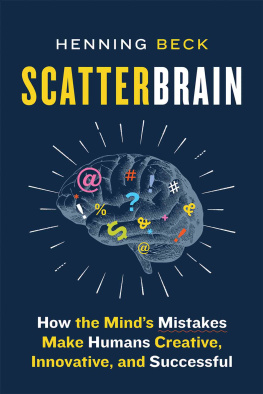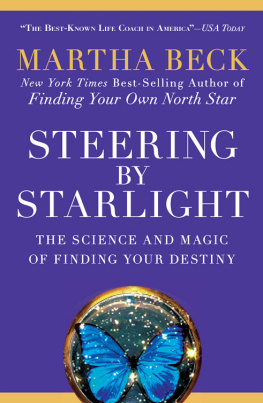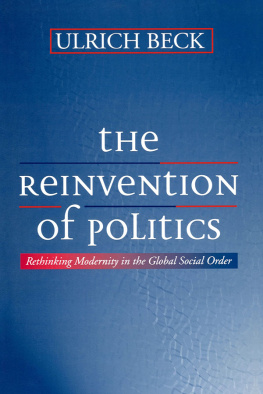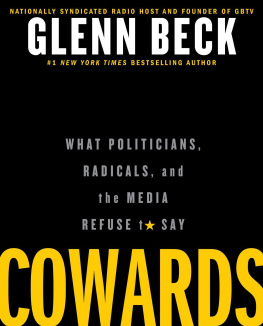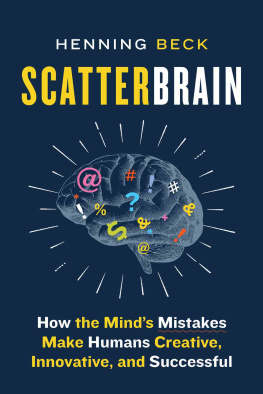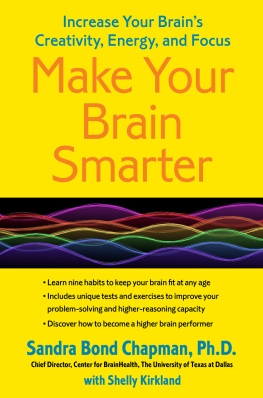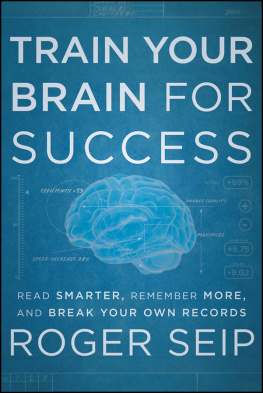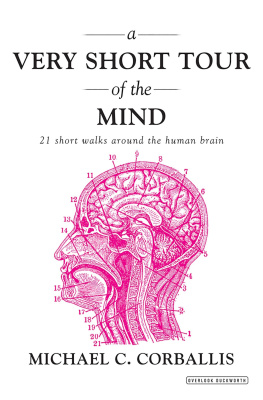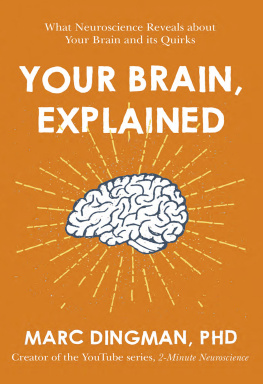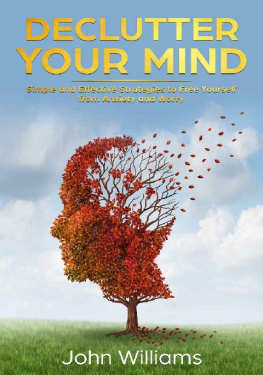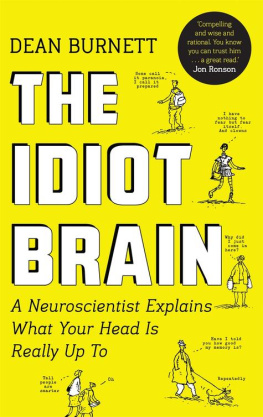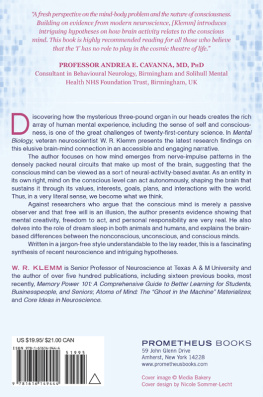Copyright 2019 by Henning Beck
Translation copyright 2019 by Becky L. Crook
Originally published in Germany by Hanser as Irren ist ntzlich: Warum die
Schwchen des Gehirns unsere Strken sind in 2017
19 20 21 22 23 5 4 3 2 1
All rights reserved. No part of this book may be reproduced, stored in a retrieval system or transmitted, in any form or by any means, without the prior written consent of the publisher or a license from The Canadian Copyright Licensing Agency (Access Copyright). For a copyright license, visit accesscopyright.ca or call toll free to 1-800-893-5777.
Greystone Books Ltd.
greystonebooks.com
Cataloguing data available from Library and Archives Canada
ISBN 978-1-77164-401-3 (cloth)
ISBN 978-1-77164-402-0 (epub)
Editing by Heather Wood
Proofreading by Jennifer Stewart
Text design by Belle Wuthrich
Jacket design by Belle Wuthrich and Fiona Siu
Jacket illustration by istockphoto.com
Greystone Books gratefully acknowledges the Musqueam, Squamish, and Tsleil-Waututh peoples on whose land our office is located.
Greystone Books thanks the Canada Council for the Arts, the British Columbia Arts Council, the Province of British Columbia through the Book Publishing Tax Credit, and the Government of Canada for supporting our publishing activities.
The translation of this work was supported by a grant from the Goethe-Institut, which is funded by the German Ministry of Foreign Affairs.

CONTENTS
Why You Wont Remember the Contents of This BookThereby Retaining the Most Important Information
Why We Are Bad at Rote Learning, but Better at Understanding the World
Why a False Memory Is Better Than None at All
Why We Choke under Pressure and the Secret Formula for Fending Off Stage Fright
Why We Always Misjudge ItThereby Forging Valuable Memories
Why We Have Trouble Switching Ourselves Offand How Daydreams Evoke the Muse
Why We Are So Flighty and Which Distractions Can Lead to More Creativity
Why the Brain Calculates Best without Numbers
Why We Risk Too MuchYet Still Choose Wisely
Why Selecting Is So Agonizingand How We Still Manage to Choose the Best Option
How Prejudices Can Help Us, How They Can Harm Usand How to Avoid Stereotypical Pitfalls
How Our Inner Deadbeat Holds Us Backand How We Can Inspire Others
Why We Cant Be Innovative at the Push of a Button Yet We Always Have New Thoughts
Why We Need Mistakes in Order to Improve
INTRODUCTION
T HIS IS NOT a book that describes how great the brain works. At least, not at first glance. Its also not a book about how perfectly the brain works. Because it doesnt.
And if, after reading this book, you are hoping to improve your brains ability to think or concentrate, Im afraid I have to nip that notion in the bud right from the start. Thats not going to happen either because the brain is anything but precise or good at calculating. Its a dreamy scatterbrain, often distracted and unfocused, never one hundred percent reliable; it miscalculates, is frequently inaccurate, and forgets more than it retains. In short, the brain is an approximately 3.3 pound mistake. You carry this head full of sloppy blunders around with you wherever you goand I would like to congratulate you for that.
Now that Ive been permitted to scare most of my readers off, I would like to let you know that there is, in fact, a reason to continue reading this book. I mean to show you that it is precisely these seemingly inefficient imperfections and bloopers that help your brain to be so exceptional and successful.
We are all familiar with this from our own lives. The brain makes mistakessometimes big ones, sometimes small ones, and not a day goes by that our brain doesnt concoct some foolishness, misjudgment, or just plain messes up. You underestimate the time, forget what it was you were just reading, or allow yourself to get distracted by your mobile phone. And this is a great thing. Because these supposed weaknesses and imperfections are what make your brain so adaptable, dynamic, and creative.
Do you think I am exaggerating? All right then, lets test your mental abilities:
Imagine youre in a race and you overtake the guy in fourth place. What is your position now?
Third place?
Well, nobut dont worry. Your brain easily creates mental boxes (see ). Never mind. Literally. Even simple addition can get complicated. How often is the letter M repeated in the next line?
MMMMMMMMMMMMMMMMMMMMMMMMMMM
Enough hemming and hawing. Its not quite as easy as it seems, is it? What this shows us is that the brain doesnt seem geared toward processing pieces of information that are indistinguishable from each other. On the contrary, it often gets bogged down with such information.
Making mistakes is what makes us tough, so making just one is never enough, my chemistry teacher once said. And then he proceeded to ignite silver acetylide and blew a crater in the schoolyard. Take note: trial and error is not always the method of choice. Sometimes it is, however, as exemplified by my neighbor. My neighbor is a truly extraordinary character. At two years old, he is already a pretty clever guy with the ability to master things that would bring any supercomputer to its knees. He is able, for instance, to identify his mothers face among a crowd of people and be aware of his own reflection in a mirror. After playing only a single time with a toy car, he knows what a car is. He can point out smoke detectors on the ceiling and thinks potatoes are yummytasks which no modern computer could undertake. At the same time, he is constantly making little mistakes. He could barely walk without stumbling a few months ago, his movements are clumsy, his speech fragmented, and he sleeps for more than half of the dayduring which time he is completely inoperable. It would be enough to make an engineer put his head in his hands: What a defective design. Two years old and it still doesnt run smoothly. A bit like a Windows operating system.
Nonetheless, my neighbor is making tremendous progress day by day, at a pace unmatched by any calculator. Every mistake, every imprecision is an incentive for him to try it differently next time and maybe even to get a little bit better. His brain is anything but perfectand it never will be. Over time, it will of course improve at adapting to its environment, but it will never be immaculate and absolute because it will always retain its ability to err. Only someone who builds mistakes into their actions will be able, at some point, to develop something innovative and new. Whoever attempts to always think as correctly as possible, by contrast, puts themselves on the level of a computer: efficient, precise, and speedybut also uncreative, boring, and predictable.
As adults, we develop an even more obvious form of intellectual drivel. We forget names and faces. We allow ourselves to become easily distracted by WhatsApp messages or lose our plan for the day in the flood of distracting morning emails. We have names on the tip of our tongues that dont ever fully come to us. We misjudge the time as poorly as we do probabilities or numbers. We struggle to choose from among several options. We go blank right before we are supposed to speak in front of an audience. We find it hard to quiet our minds after an exhausting day at work and are the worst at retaining information and learning under pressure.

